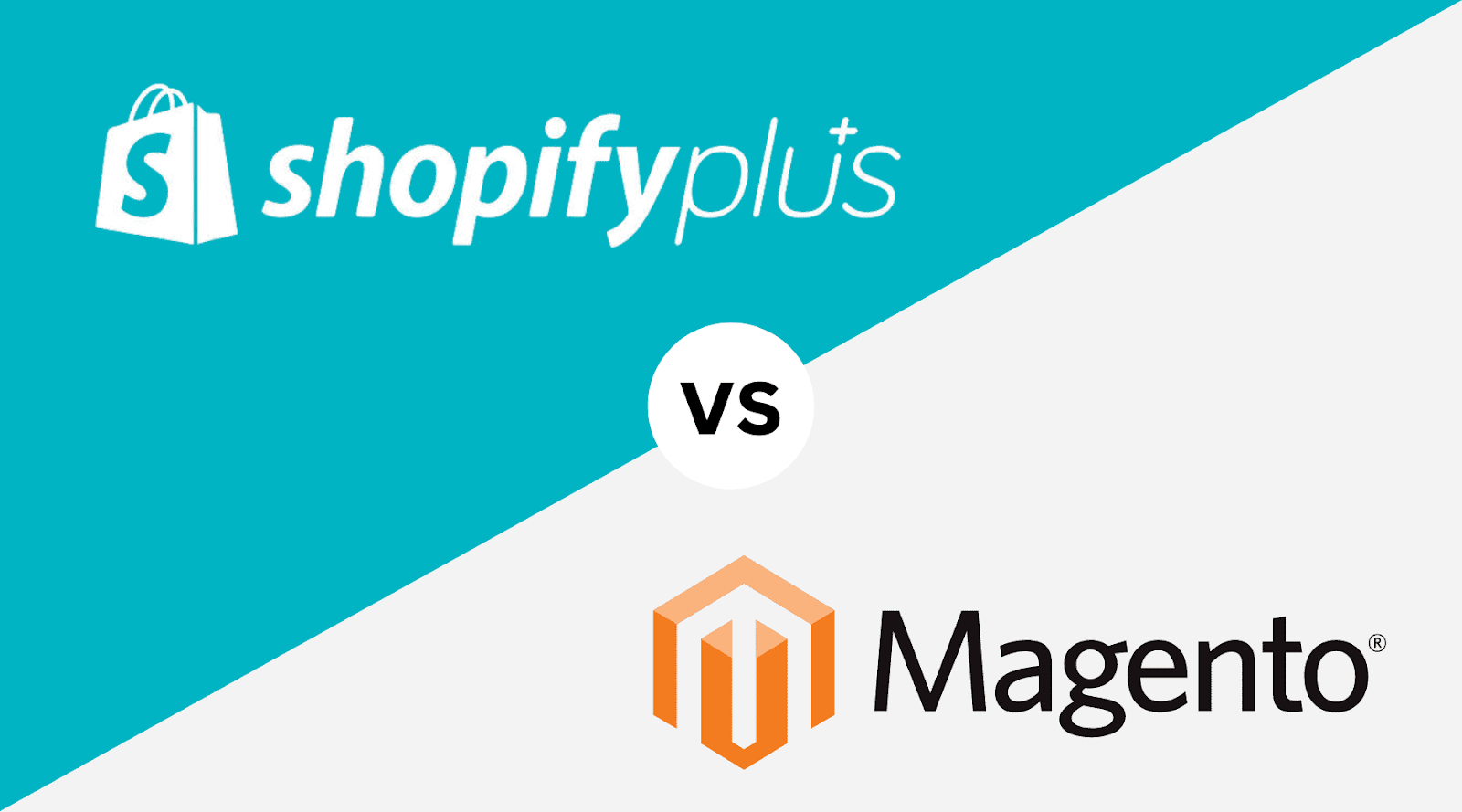You’re preparing for the next big step in e-commerce and trying to decide between Shopify Plus and Magento. This choice will directly influence your scalability, technical resources, and time-to-market.
Both platforms promise enterprise-level capabilities, but the paths to get there differ significantly. In this article, you’ll learn how Shopify Plus and Magento compare across 15 concrete categories. You’ll also get a clear assessment of which platform fits which use case, along with key considerations for a smooth migration.
What is Shopify Plus and what is Magento?
If you want to build a scalable ecommerce store, the two enterprise platforms Shopify Plus and Magento, also known as Adobe Commerce, are essential options.
Both systems support ambitious business models, although they differ fundamentally in their technical architecture, operational responsibilities and strategic direction.
Shopify Plus is a fully hosted SaaS platform that is designed to remove technical overhead for you. Hosting, security updates, maintenance and scaling are handled centrally and you do not need to manage them yourself.
The infrastructure is built for high traffic, optimized for conversion and structured to require very little maintenance over time. As a merchant, you receive a fast and scalable solution that allows you to focus on your business instead of dealing with infrastructure, DevOps or server configurations.
This approach is especially valuable for D2C brands and growing B2B companies, because they can invest their time in product development, marketing and community building.
Magento, which is now marketed as Adobe Commerce, follows a different idea. The platform is open source and requires self hosting and an experienced development team. This gives you maximum flexibility and full control over every part of your store, from data structures to checkout logic.
This level of freedom creates high demands for maintenance, ongoing development and daily operations. Security updates, server management, performance and scaling are your responsibility or the responsibility of your implementation partner. The platform provides many possibilities, sets few limits and requires strong technical expertise.
The core difference lies in the design of the systems. Shopify offers a standardized but powerful enterprise platform that can be extended and customized within clearly defined technological boundaries.
Magento functions as a framework for custom ecommerce architectures. It allows nearly unlimited levels of customization and comes with higher ongoing operational requirements.
If your priority is fast time to market, low dependence on internal IT and a clear scaling strategy, Shopify is the better choice.
If your company relies on its own system landscape, unique processes and complete technological control, Magento can be the more suitable option, provided you are prepared to support the technical foundation on a permanent basis.
The 15 most important comparison points at a glance
You can see which platform fits your business model more effectively by looking at the systems side by side. The following points show how much the platforms differ in technology, required effort and growth potential. You receive clear criteria that support your decision.

1. Hosting & infrastructure
A major difference lies in the infrastructure. Magento requires self managed hosting. This means you need a fast and reliable server, regular maintenance, manual security updates and a team that actively takes care of the entire setup.
Shopify Plus follows a completely different approach. The platform is fully cloud based and functions as a SaaS solution. You do not have to manage hosting, server administration or updates. The system handles everything in the background.
The hosting environment scales globally, supports millions of visits and remains available at all times. Your store stays stable, fast and secure during events such as Black Friday, television exposure or international expansion.
This architecture creates a clear advantage. You can focus on growth, product development and sales while the system removes the need to deal with DevOps related tasks. This saves resources, reduces technical risks and gives you more space for innovation.
For D2C brands and companies with strong growth ambitions, this becomes a real performance driver. The cloud based ecommerce platform removes the IT overhead for you, while Magento requires that you manage it continuously.
2. Setup & time to market
If you want to launch a new store, every week matters. The timing of the go live can determine whether you seize a market opportunity, position a product at the right moment or respond to seasonal demand. This is where the difference becomes very clear.
Magento requires extensive technical preparation. Server setup, theme development and the integration of external systems often take several weeks and sometimes even months. The launch can be delayed significantly depending on the complexity and the surrounding infrastructure.
Another factor is that many Magento projects slow down because internal resources are limited or external partners do not have enough capacity. This often results in delayed releases, postponed campaigns and lost revenue.
Shopify Plus is built for speed. The platform allows you to go live within a few days, even when your setup is more advanced. Standard features, templates and integrations are available immediately.
You can begin right away, expand your store step by step and refine it over time. Technical barriers are almost completely removed thanks to the cloud based approach.
This fast time to market becomes a real competitive advantage. You can test ideas sooner, scale sooner and generate revenue sooner. While a Magento store may still be in development, your Shopify Plus store can already be live and collecting data, customer insights and sales.
Anyone who thinks strategically will move far more efficiently with this ecommerce platform, especially if you want a performance driven setup that keeps pace with your ambitions.
3. Usability

4. Extensibility / app ecosystem
The needs of your store evolve constantly. New features, integrations and marketing tools must be implemented without delay. This is where the real differences between the platforms become visible.
Magento offers a wide range of plugins, which creates a high level of theoretical flexibility. In practice the situation is often very different. Many extensions in the Magento marketplace are outdated, poorly documented or incompatible with other modules.
Updates regularly lead to conflicts, performance issues or security problems. Anyone who expands the system in this way often takes on significant technical risk and must reserve resources for ongoing maintenance and troubleshooting.
Shopify Plus follows a different approach. The Shopify App Store provides more than eight thousand reviewed applications that all meet clear quality and security standards.
Every app is validated individually and many are developed by certified partners. This lowers the risk during integration and speeds up the entire process. Features such as subscription commerce, international tax handling or loyalty programs can be added within minutes.
Shopify Plus also offers advanced interfaces for more specific needs. With the Shopify APIs you can build custom features or connect external systems. Internal workflows can be managed efficiently with custom apps or automation tools such as Shopify Flow.
The advantage is easy to see. You can scale with flexibility, test new features quickly and still rely on a stable system. Magento offers more raw material, while Shopify provides a far more efficient toolbox. For most growth oriented brands this creates a stronger foundation for long term development.
5. Themes & design customization
A professional design is more than a matter of appearance. It is a key element for conversion, brand perception and trust. Anyone who needs a consistent, high performance and brand aligned frontend will quickly face practical challenges when choosing the right shop system.
Magento offers complete design freedom in theory. In practice the customization of templates is time consuming and often outdated. Many available themes originate from the Magento one era, are technically outdated or do not provide proper responsive behavior.
Even small layout adjustments require deeper changes in the code, which increases the demand for technical knowledge and time. This becomes a serious issue for brands that care about a strong visual identity, especially when launches, campaigns or seasonal updates need to be implemented at short notice.
Shopify solves this challenge in a far more elegant way. The theme store provides more than two hundred modern responsive designs that are optimized for conversion, loading speed and mobile usage.
These themes can be customized through a visual editor without any programming skills. Colors, fonts, modules and layouts can be adjusted directly in the backend, which allows your team to react quickly to design requirements.
If you need more advanced customization, you can extend the design through Liquid, the platform’s template language. For complex projects you can work with specialized Shopify partners who can translate your brand vision quickly and efficiently. This allows you to apply your corporate identity without compromising on quality or performance and without relying on an internal development team.
The result is a far faster time to market for new layouts, landing pages and brand campaigns. Magento may offer complete creative freedom on paper, but Shopify Plus delivers speed, stability and ease of use in real world scenarios.
6. B2B functionality
If you operate in the B2B sector, you need far more than an appealing frontend. Complex pricing structures, individual approval processes, differentiated login areas and ERP integrations are often the minimum requirements. This is where the true capabilities of a commerce platform become visible.
Magento was the leading choice in B2B commerce for many years. The platform includes features such as customer specific pricing rules, request for quote options and role based user permissions.
These features are not ready to use in their default state. They need to be activated, configured and in many cases deeply customized. With more complex business models this leads to long project timelines, demanding testing phases and an increased dependence on internal IT.
Shopify Plus takes a much more pragmatic approach. With the B2B module you can begin immediately. Customer accounts, individual price lists, company specific assortments and adjusted ordering processes can be configured without deep code work. This means you reach the market faster, reduce complexity and still retain control over key workflows.
You can also extend your processes through APIs and apps, for example to integrate your ERP system, support approval flows or manage multi level pricing logic. This makes the platform a serious option for demanding B2B environments.
You do not start from scratch. Shopify provides many essential features by default and can be adapted with flexibility. For companies that want speed, scalability and strong B2B performance without building a fully custom solution, this becomes a clear advantage compared to Magento.

7. Multichannel and omnichannel capability<
Customers expect to find products wherever they spend their time, whether that is Instagram, TikTok, Amazon or a dedicated online store. Brands that rely on a single channel lose reach and potential revenue. Multichannel commerce is no longer optional, it is essential for companies that want to scale.
Magento can be prepared for omnichannel use, although this usually requires external tools, custom interfaces and additional development work. There is no native central management for social platforms or marketplaces.
Anyone who wants to list products on Meta platforms, Google Shopping or Amazon needs custom integrations or middleware solutions. This consumes time, increases costs and reduces operational flexibility.
Shopify Plus takes this much further. The platform includes more than twenty sales channels by default. Products can be managed from one place and published across Instagram, TikTok, Pinterest, Google, Amazon and physical point of sale systems.
Marketplaces such as eBay or Zalando can also be connected through certified apps. You manage visibility, inventory and campaigns from a single backend in real time without adding extra work for your team.
You reach your audience exactly where they buy and you can plan, manage and scale campaigns across all channels. For brands that focus on growth, this creates a real competitive advantage. Magento is capable of similar results, although only with additional effort. Shopify provides these tools immediately.
8. Internationalization
If you want to sell in several countries, you need more than a translated homepage. Currencies, taxes, payment methods, fulfillment processes and languages must work together smoothly, otherwise conversion and trust will suffer. This is where the true level of international readiness becomes visible.
Magento provides the technical foundation for international stores. The implementation, however, is demanding. Each language or currency variation requires a dedicated store view that needs to be maintained and updated separately.
This increases complexity in the backend and affects all areas of daily work, from content management to system maintenance. This structure quickly becomes difficult to handle in fast moving markets.
Shopify uses a centralized approach. Multi language features, multi currency capability and region specific domains are built directly into the system. You can define regional prices, languages, taxes and currencies while still managing everything through a single dashboard. This reduces workload, minimizes the risk of mistakes and allows your team to react faster to market changes.
For brands that want to scale internationally at high speed, this advantage is essential. You do not need additional IT infrastructure or external translation systems. The platform provides the required flexibility from the beginning.
Magento can also support international growth, although it requires far more setup work, technical knowledge and ongoing maintenance. For companies that aim to enter new markets quickly, Shopify offers a significant advantage.
9. Checkout & conversion
The checkout process determines whether a purchase is completed or abandoned. Every unnecessary click, any delay in loading and every technical error can reduce conversion, especially for mobile users. A fast and stable checkout is therefore not optional, it is essential for business success.
Magento provides a high level of flexibility in the checkout process. You can design almost every step individually, integrate custom modules and adjust form fields. This level of freedom also creates significant risk.
Many stores rely on custom or outdated checkout extensions that interfere with each other, do not behave well on mobile devices or cause long loading times. Payment issues or technical errors during the purchase process immediately result in lost revenue.
Shopify Plus takes a different approach. The checkout is intentionally standardized and optimized for speed, stability and mobile usability. Every Shopify Plus store uses the same technological foundation that reliably handles millions of transactions worldwide. Errors are resolved centrally and updates are applied automatically.
Shopify also offers exclusive features such as the script editor. This allows targeted checkout customization, for example dynamic discounts, adapted payment options or rules for B2B customers, without putting system stability at risk. You receive customization options within a proven and secure framework.
The result is faster loading times, fewer abandoned carts and higher conversion rates. For brands that prioritize performance, this becomes a clear argument in favor of Shopify Plus, especially when scalability and efficiency are top priorities.

10. Performance & scalability
As your store grows, the demands on system performance and availability increase. Marketing campaigns, product launches and flash sales reveal whether your platform can keep up or whether it collapses under pressure. Scalability is more than a question of server capacity, it is a requirement for sustainable growth.
Magento can scale in principle, although the scalability depends entirely on your infrastructure, your development resources and your preparation.
Every peak in traffic must be planned, tested and secured in advance. This requires expertise, monitoring systems, additional server capacity and in many cases load testing. Without timely investment you risk long loading times, error pages or even system failures, all of which have an immediate impact on conversion and revenue.
Shopify Plus removes this complexity. The platform is designed to remain stable even when traffic is very high and multiple campaigns run at the same time. Whether you receive one thousand or one hundred thousand simultaneous visitors, the system scales in the background without any need to adjust infrastructure or manage load distribution manually.
Large brands such as Gymshark and Allbirds operate their Black Friday campaigns without performance issues, which demonstrates the scalability of the platform.
The platform also offers tools such as Launchpad and Shopify Scripts that help you plan, manage and optimize promotions. For companies with strong growth ambitions this creates a major advantage. You can focus on marketing, product strategy and conversion rather than on server management or technical bottlenecks.
If your business model depends on scaling, Shopify Plus becomes a natural choice. Magento can achieve similar results but only with significant effort.
11. Security & compliance
Security is not optional in ecommerce, it is essential. As soon as you process customer data and handle payments you carry responsibility. Enterprise level customers and regulatory authorities expect a high standard of data protection, reliability and compliance.
With Magento the responsibility for security rests entirely with you. You must install SSL certificates, patch your infrastructure regularly and monitor and address security vulnerabilities in your code. You are also responsible for meeting PCI DSS requirements, the global security standard for credit card transactions.
This creates continuous workload, clear internal responsibilities and additional costs for security audits and monitoring tools. Even with these measures a certain level of risk remains due to outdated extensions or configuration errors.
Shopify Plus takes a different approach. The platform is PCI DSS certified by default and meets all requirements for modern security architectures. SSL encryption is active on the entire site, not only in the checkout.
Shopify manages regular security updates, DDoS protection and server hardening without any need for your involvement. Requirements related to data protection are supported through integrated features such as data export tools and cookie consent solutions.
This reduces your security workload and increases legal certainty while creating a stable foundation for growth. You can rely on the platform to remain secure even during periods of high traffic, new feature launches or international expansion.
For brands with limited technical resources this security level becomes a decisive advantage. You reduce risk, avoid costly downtime and build trust with your audience.
12.Support and guidance
In an enterprise environment the platform itself is only part of the equation. The reliability of the support structure is just as important. With Magento you depend heavily on your agency or your internal developers. The community is large, although community support reaches its limits when time sensitive issues or critical system errors appear.
Shopify Plus provides a dedicated support system that is designed for scaling businesses. With personal launch engineers, twenty four hour enterprise support and direct technical contacts you receive more than assistance, you receive active guidance.
This is especially valuable during the migration phase and when new features are rolled out. You are not left on your own and solutions are offered proactively.
For brands that focus on performance this becomes a major advantage. Fast response times, direct communication and technical expertise reduce friction and increase confidence in daily operations.
13. Costs & pricing models
Pricing is never simple in enterprise commerce, although clarity is essential. Magento is known for overall costs that are difficult to predict. License fees, hosting, development, maintenance, security measures and extensions all generate ongoing expenses that often become fully visible only during long term operation.
What first appears to be a flexible open source solution can quickly develop into a cost intensive setup when each feature requires individual development and continuous care.
Shopify uses a different model. You pay a fixed monthly fee starting at around two thousand euros depending on your revenue structure. Hosting, updates, security, support and many enterprise features are included. This creates a predictable cost model with very little overhead. It is highly attractive for financial leaders who prioritize budget control and a clear return on investment.
In the long term this results in lower total cost of ownership and more budget flexibility for marketing, product development or international expansion. You invest in growth rather than in technical maintenance.
14.Migration from Magento to Shopify Plus
Many Magento stores eventually reach technical and operational limits. Outdated code bases, inconsistent data structures and slow development cycles turn updates and new features into ongoing construction sites. A move to a modern platform such as Shopify Plus often appears daunting, although it is more manageable than expected.
Shopify provides specialized tools and programs for a secure transition. With the Transporter tool you can migrate product data, customer data and order history in a structured and efficient way. Launchpad supports the timed rollout of new features or relaunches. Even complex migration projects can be executed in clear and manageable steps.
The shift from Magento Enterprise to Shopify Plus opens up new possibilities from a technical and organizational perspective. You gain speed, reduce complexity and free your team from limitations caused by legacy systems. For brands that focus on growth this becomes a strong competitive advantage.
15.Future readiness and product vision
Magento two is losing momentum in terms of innovation. The once strong ecosystem is shrinking, many developers are moving away and new releases arrive slowly with increasing complexity. For companies this leads to greater dependence on specialists, reduced agility and a system that feels more like maintenance than progress.
Shopify Plus moves in the opposite direction. The platform invests continuously in future oriented features, including B2B improvements, AI supported workflows and automation throughout the customer journey.
Additional APIs, improved developer tools and strong partner programs allow you to implement individual requirements with high performance.
A direct comparison between Magento two and Shopify Plus makes the difference clear. Shopify follows a focused product vision built on scalability, innovation and user centered design. You benefit from a platform that not only grows with you but also provides continuous momentum for further expansion.

Shopify Plus vs Magento – a comparison at a glance
|
criteria |
Shopify Plus |
Magento (Adobe Commerce) |
|
System type |
SaaS (cloud-based, hosted) |
Open Source / PaaS (self-hosted or cloud) |
|
Target group |
Scalable D2C and B2B brands from 1 million in sales |
Complex enterprise projects with in-house IT |
|
Setup & Usability |
Intuitive, no developers required |
Technically demanding, developer required |
|
Design templates |
200+ themes, 13 of which are free, mobile optimized |
9 free templates, high customization effort |
|
App ecosystem |
8,000+ tested apps, strong integration |
Many extensions, but little compatibility control |
|
Individualization |
APIs, custom apps, Shopify scripts (Plus only) |
Full code access, developer required |
|
Checkout customization |
Only with Shopify Plus (via scripts) |
Fully customizable (developer side) |
|
B2B functionality |
Customer segmentation, individual pricing (Plus) |
Native B2B functions including ERP integration |
|
Multichannel / Omnichannel |
Over 20 channels (social, marketplaces, POS) |
Hardly any native connections, high customizing effort |
|
Hosting & Maintenance |
Fully managed by Shopify, 99.99% uptime |
Personal responsibility with open source |
|
Security & Compliance |
PCI-DSS compliant, SSL, GDPR ready |
High effort for security & updates |
|
Scalability |
Enterprise-ready (Flash Sales, Black Friday etc.) |
Only performant with a strong IT structure |
|
Cost structure |
From €2,000/month (plannable, transparent) |
Entry usually €20,000/year+, depending on sales |
|
Support & partner network |
Dedicated launch team, 24/7 support |
Community-supported, Adobe Support only in the e-commerce package |
|
Future & Product Vision |
Focus on AI, automation, B2B, API-first |
Complex stack, declining community, slow releases |
Conclusion: Shopify Plus vs Magento and which option suits you best
Conclusion: Shopify Plus vs Magento and which option suits you best
The decision between Shopify Plus and Magento does not depend on feature lists. It depends on your strategic direction as a business. If you want to scale quickly, focus on your core operations and avoid tying up internal resources for maintenance, DevOps or upgrades, Shopify becomes the clear choice. The platform delivers speed, stability and an architecture designed for growth.
If your company relies on highly individual processes, deep system integrations and complete technological control, and if you have the development team to support that level of complexity, Magento can be the right foundation, although it requires more effort and ongoing management.
For brands that prioritize performance, time to market, conversion and scalability, our recommendation is clearly Shopify Plus. You gain a future ready system that evolves continuously and a platform that accelerates your business rather than slowing it down.
As a specialized Shopify Plus agency, Datora supports you in implementing custom requirements. We build the features that are essential for your growth, outside of Shopify’s standard feature set but fully integrated into your environment. Whether you need B2B workflows, complex product logic or scalable store architectures, we help you unlock the full potential of Shopify.
Want to explore more comparisons?
These topics may also be of interest to you.








